Hands-on Lab Skills/Science Inquiry
Science inquiry and hands-on lab skills are essential components of a first-grade science curriculum. These skills help students develop critical thinking, problem-solving, and observational skills. Through hands-on activities and experiments, students can explore scientific concepts and develop a deeper understanding of the natural world.
Key Concepts
- Observation: Students will learn to use their senses to gather information about objects, events, and phenomena.
- Experimentation: Students will engage in simple experiments to test ideas and hypotheses, and learn about cause and effect.
- Measurement: Students will practice using basic tools for measurement, such as rulers, thermometers, and scales.
- Recording Data: Students will learn to record their observations and experimental results in a clear and organized manner.
- Scientific Method: Students will be introduced to the basic steps of the scientific method, including making observations, asking questions, forming hypotheses, conducting experiments, and drawing conclusions.
Hands-On Activities
Here are some hands-on activities and experiments that can help students develop their lab skills and practice science inquiry:
- Observation Walk: Take students on a nature walk and encourage them to use their senses to observe and describe the things they see, hear, smell, and touch.
- Sink or Float Experiment: Provide students with a variety of objects and ask them to predict whether each object will sink or float in water. Then, conduct the experiment to test their predictions.
- Measuring Madness: Set up stations with different measurement tools, such as rulers, measuring tapes, and scales, and allow students to explore and practice using each tool.
- Recording Weather Data: Have students keep a daily weather journal where they record observations about the weather, such as temperature, precipitation, and cloud cover.
- Seed Germination Experiment: Provide students with different types of seeds and guide them through an experiment to observe and record the germination process.
Study Guide
Use the following questions to guide students' understanding of hands-on lab skills and science inquiry:
- What are some tools scientists use to make observations and gather data?
- Why is it important to record data in a science experiment?
- What are the steps of the scientific method?
- How can we use our senses to make observations about the natural world?
- What are some examples of things that sink and float in water?
- How do we measure different properties, such as length, weight, and temperature?
- What kinds of things can we observe and record in a weather journal?
- What happens to a seed during the germination process?
◂Science Worksheets and Study Guides First Grade. Hands-on Lab Skills/Science Inquiry
Study Guide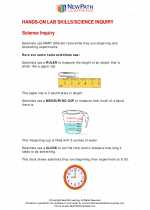 Hands-on Lab Skills/Science Inquiry
Hands-on Lab Skills/Science Inquiry  Worksheet/Answer key
Worksheet/Answer key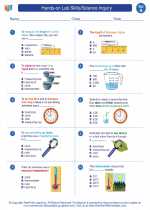 Hands-on Lab Skills/Science Inquiry
Hands-on Lab Skills/Science Inquiry  Worksheet/Answer key
Worksheet/Answer key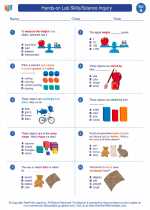 Hands-on Lab Skills/Science Inquiry
Hands-on Lab Skills/Science Inquiry  Worksheet/Answer key
Worksheet/Answer key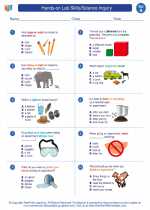 Hands-on Lab Skills/Science Inquiry
Hands-on Lab Skills/Science Inquiry  Vocabulary/Answer key
Vocabulary/Answer key Hands-on Lab Skills/Science Inquiry
Hands-on Lab Skills/Science Inquiry  Vocabulary/Answer key
Vocabulary/Answer key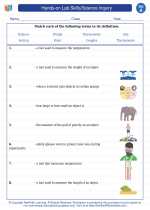 Hands-on Lab Skills/Science Inquiry
Hands-on Lab Skills/Science Inquiry 

 Worksheet/Answer key
Worksheet/Answer key
 Worksheet/Answer key
Worksheet/Answer key
 Worksheet/Answer key
Worksheet/Answer key
 Vocabulary/Answer key
Vocabulary/Answer key
 Vocabulary/Answer key
Vocabulary/Answer key

The resources above cover the following skills:
EARTH AND SPACE SCIENCE
Earth’s Place in the Universe
Observe seasonal patterns of sunrise and sunset to describe the relationship between the number of hours of daylight and the time of year (e.g., more hours of daylight during summer as compared to winter).